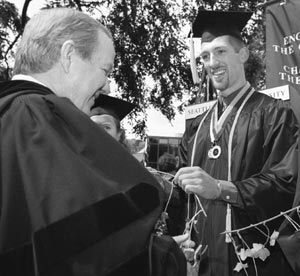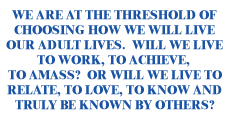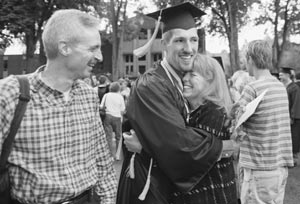By Reed Warrick, Class of 2001
Photos By Daniel Sheehan
![]()
![]()

Seek to know. What do these three words mean to you?
Do they mean understanding the cost-benefit analysis in order to succeed in business, memorizing the human anatomy for medical endeavors, or perusing the DSM-IV to diagnose clinical disorders?
For some reason, all of this knowledge leaves me wanting more. No matter how much knowledge we gain, we still fight feelings of insignificance. Titles, honors and awards do little to ease the restlessness in our hearts.
This is because we are created for so much more than the pursuit of knowledge and the quest for prominence. God created us to love and to be loved. We are relational at the core of our beings. We long to know and to be known by others. This is where we find our significance. Facts, figures, theorems and procedures won't satisfy our cravings.

At the annual Ivy Cutting ceremony in June, President Philip Eaton first cut the continuous loop of ivy near Ivy Honorary President Reed Warrick.
Three weeks ago, while I was eating in a restaurant, I had a memorable conversation with a server. Well-read in philosophy, theology and classic literature, this server hungered for knowledge. He eagerly asserted his opinions and engaged me in an intellectual debate, yet there was no denying the turbulence in his soul. The longer we talked, the more apparent this turbulence became. His brazenness and intellectualism were masking a gnawing fear — the fear of dependence, the fear of needing other people, compounded by past experiences of relational letdowns and emotional scars.
This bright and gifted young man constantly seeks people to engage. But his apparent desire for intellectual stimulation is not the driving force behind his incessant efforts. He wants to be with people because he longs to be known. I could hear the questions he was really asking:
"Will you hear me out? Will you seek to know who I really am? I have so many dreams and so many fears. I desperately want a friend." To make a long story short, I did hear him out. I asked about his dreams and empathized with his fears. What started out as a simple, "How's it going?" turned into a four-hour conversation and an inspiring friendship.

Our conversation cost me little, but blessed me abundantly. All I did was make myself available and God did the rest. Our Heavenly Father created the human race to be in relationship, and He holds each of us responsible for seeking to know and connect with the people in our lives. He honors our efforts to seek to know both Him and His children.
At the end of our conversation, this young man, who was not a Christian, told me his name: "Manny, short for Emmanuel," which means, "God with us."
I found out later that when Manny returned home that night, his mother initiated a reconciliation of their relationship after five years of conşict. He told me that he cried for the first time in years. These were the tears of a weeping soul, finally invited by love to surface and begin the healing process.
Like Manny, we graduates are all scholars longing for meaningful relationships. I think we can learn from his story, if we are willing to ask ourselves several critical questions: Why am I studying? How does all of this head knowledge contribute to my heart knowledge? In what ways do my classes equip me to better love God and the people I see every day?
I am a strong proponent of lifelong learning, and I strive for excellence in my academic pursuits. But I am also realizing that twenty years from now, I will not remember the exams, the facts or the points of my papers. I will remember the faces, the adventures and the meaningful relationships that I have nurtured here at Seattle Pacific University. I want to devote my energies to eternal significance rather than fleeting prominence.
Twenty years from now, our loved ones won't care about our grades or the classes we took. They will care about the people we have become as a result of our seeking to know God and others in a meaningful way.
We are at the threshold of choosing how we will live our adult lives. Will we live to work, to achieve, to amass? Or will we live to relate, to love, to know and truly be known by others?

"God has given me amazing parents who exemplify what it means to live as Christ did", says Warrick. "They have a genuine vitality for life."
Hearts are crying out to be known. But we fear the risks of rejection, humiliation and exposure. The greatest risks are said to yield the greatest rewards. Will we allow ourselves to be transformed by the relationships that surround and beckon us? Will we risk our privacy and comfortable seclusion to experience intimacy unlike any we've ever known? Will we obey the greatest commandments of all time, to love God and love our neighbors?
If so, it's time that we seek to know!
Anyone who talks with Reed Warrick for a minute knows that he is serious about his faith. Warrick, 22, from Lake Forest Park, Washington, graduated in June with a bachelor of arts degree in psychology. He decided on that major because, as he says, understanding people is basic to success in a number of life pursuits.
One of these life pursuits, Warrick believes, is experiencing God in profound ways, and another is somehow changing the world for good. "We long to leave a legacy, to know beyond a doubt that our lives matter," says Warrick. Being a dorm resident for four years and a mentor to younger students taught him that humans everywhere — even in a Christian university < are "starving for significance."
For up-and-coming SPU students, Warrick leaves this bit of advice: "Befriend your professors! Utilize office hours. Establish mentors. Stretch yourself beyond classroom instruction — seek wisdom and life lessons."
![]()

| Please
read our
disclaimer.
Send any questions, comments or correspondence about Response to
jgilnett@spu.edu or call 206-281-2051. Copyright © 2001 University Communications, Seattle Pacific University.
Seattle Pacific University |